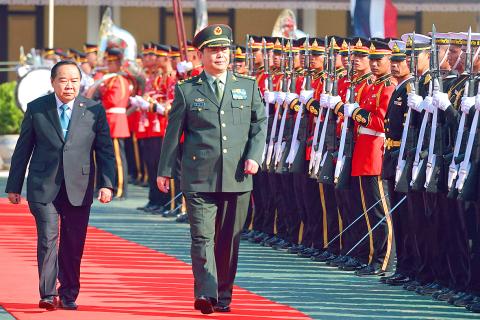China and Thailand yesterday agreed to boost military ties over the next five years, from increasing intelligence sharing to fighting transnational crime, as Thailand’s ruling junta seeks to counterbalance the country’s alliance with Washington.
The agreement came during a two-day visit by Chinese Minister of Defense General Chang Wanquan (常萬全) to Bangkok, and as Thailand’s military government looks to cultivate Beijing’s support amid Western unease over a delayed return to democracy.
“China has agreed to help Thailand increase protection of its own country and advise on technology to increase Thailand’s national security,” Thai Minister of Defense General Prawit Wongsuwan said.

Photo: AFP
“China will not intervene in Thailand’s politics, but will give political support and help maintain relationships at all levels. This is China’s policy,” he said.
Under the junta, Thailand has stepped up engagement with China at a time when Beijing increases its influence in Southeast Asia with a raft of loans and aid for infrastructure.
At the same time, Washington has sought to show its renewed commitment to a strategic “pivot” toward Asia by boosting military ties and equipment sales across the region.
Prawit said Thailand and China agreed to increase joint military exercises, but did not give further details.
“We agreed to increase joint military exercises between Thailand’s air force and China’s air force and to increase overall military cooperation over the next three to five years,” he said.
Thailand’s army took control in May last year, saying it needed to restore order after months of political unrest that included street protests in Bangkok that killed nearly 30 people. The US, a long-time ally of Thailand, expressed dismay at the coup and froze US$4.7 million of security-related assistance and canceled some security cooperation.
US-Thai relations deteriorated further last month when Bangkok accused Washington of meddling in its political affairs over the remarks by a visiting US envoy who criticized the junta.
The junta has said it will hold onto power for at least another year, with a general election planned for early next year.
Despite the tensions, the US will hold its annual Cobra Gold combined military exercise with Thailand next week. However, the drill has been scaled down in scope to humanitarian assistance and disaster relief.
The drill, Asia-Pacific’s largest annual multinational military exercise, also involves China.

AIR SUPPORT: The Ministry of National Defense thanked the US for the delivery, adding that it was an indicator of the White House’s commitment to the Taiwan Relations Act Deputy Minister of National Defense Po Horng-huei (柏鴻輝) and Representative to the US Alexander Yui on Friday attended a delivery ceremony for the first of Taiwan’s long-awaited 66 F-16C/D Block 70 jets at a Lockheed Martin Corp factory in Greenville, South Carolina. “We are so proud to be the global home of the F-16 and to support Taiwan’s air defense capabilities,” US Representative William Timmons wrote on X, alongside a photograph of Taiwanese and US officials at the event. The F-16C/D Block 70 jets Taiwan ordered have the same capabilities as aircraft that had been upgraded to F-16Vs. The batch of Lockheed Martin

US President Donald Trump yesterday announced sweeping "reciprocal tariffs" on US trading partners, including a 32 percent tax on goods from Taiwan that is set to take effect on Wednesday. At a Rose Garden event, Trump declared a 10 percent baseline tax on imports from all countries, with the White House saying it would take effect on Saturday. Countries with larger trade surpluses with the US would face higher duties beginning on Wednesday, including Taiwan (32 percent), China (34 percent), Japan (24 percent), South Korea (25 percent), Vietnam (46 percent) and Thailand (36 percent). Canada and Mexico, the two largest US trading

GRIDLOCK: The National Fire Agency’s Special Search and Rescue team is on standby to travel to the countries to help out with the rescue effort A powerful earthquake rocked Myanmar and neighboring Thailand yesterday, killing at least three people in Bangkok and burying dozens when a high-rise building under construction collapsed. Footage shared on social media from Myanmar’s second-largest city showed widespread destruction, raising fears that many were trapped under the rubble or killed. The magnitude 7.7 earthquake, with an epicenter near Mandalay in Myanmar, struck at midday and was followed by a strong magnitude 6.4 aftershock. The extent of death, injury and destruction — especially in Myanmar, which is embroiled in a civil war and where information is tightly controlled at the best of times —

China's military today said it began joint army, navy and rocket force exercises around Taiwan to "serve as a stern warning and powerful deterrent against Taiwanese independence," calling President William Lai (賴清德) a "parasite." The exercises come after Lai called Beijing a "foreign hostile force" last month. More than 10 Chinese military ships approached close to Taiwan's 24 nautical mile (44.4km) contiguous zone this morning and Taiwan sent its own warships to respond, two senior Taiwanese officials said. Taiwan has not yet detected any live fire by the Chinese military so far, one of the officials said. The drills took place after US Secretary